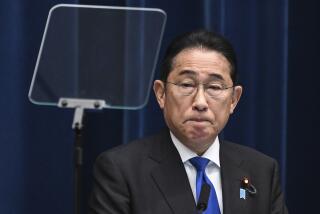Outsider Gives Ruling Party a Wake-Up Call
- Share via
TOKYO — Japan’s political establishment was jolted by the election this week of outsider Etsuko Kawada to the lower house of parliament. The 51-year-old ran as an independent, attacking collusion between politicians and bureaucrats, slamming irresponsible big corporations and pledging to fight for a government open to the people.
The country’s ruling party--grappling with a gaffe-prone prime minister, several brewing scandals and an urban electorate increasingly dissatisfied with politics as usual in Japan--vowed to take her victory to heart.
“We take this result seriously and will work to regain the trust and understanding of Japanese voters,” Hiromu Nonaka, secretary-general of the ruling Liberal Democratic Party, or LDP, said after the results were announced.
Japan has seen its share of reform-minded candidates come and go, including some later forced out of office by scandals of their own making. But the outspoken Kawada convinced many voters in Tokyo’s 21st District that she’s the real thing, in large part because of a living reminder of the cost of collusion: her son.
Kawada is the mother of 24-year-old Ryuhei, a hemophiliac who, along with hundreds of others, contracted the human immunodeficiency virus in the 1980s after receiving assurances from Japanese bureaucrats and drug companies that the blood he received presented no risk.
It later turned out that the Health Ministry and manufacturers were well aware that the blood was contaminated but sought to protect the domestic pharmaceutical industry.
With the support of his mother, Ryuhei was the first plaintiff to go on nationwide television and point the finger at Japan Inc., a brave move in a country where even today talking about HIV and AIDS is taboo. “We’re not simply dying,” he told an electrified nation in 1995. “We’re being murdered one by one.”
Challenging and then beating the system are a pretty good record to run on in any country, but this is especially true in Japan, with its tradition of compromise and insider dealing.
Kawada fought legal hurdles, bureaucratic stonewalling and public opprobrium for years, in a protracted battle that also cost her her marriage. Finally, in 1996, Japanese bureaucrats and drug company executives bowed deeply, admitted responsibility and agreed to reform their long-standing practices.
Kawada says she had been reluctant to run in Sunday’s by-election, called after an opposition Democratic Party lawmaker was accused of skimming funds. But her son’s urging tipped the balance, she says.
She was soon dubbed “the eye of the storm” as she marshaled 4,000 volunteers in defiance of the established political machines, in the process defeating the LDP.
Political analysts see in this election evidence of the growing divide between urban, independent-minded voters tired of the same old game and a rural electorate still addicted to LDP pork-barrel politics.
“Voters have increasingly been alienated from established political parties,” said an editorial Monday in the Yomiuri Shimbun, Japan’s largest daily newspaper. And “the LDP appears to be a political party that tries to maintain the status quo by shelving issues that need to be resolved right away.”
Despite the disenchantment of city voters, however, there are still enough rural supporters pleased with farm subsidies and large rural public works projects to make the LDP hesitate about changing the party’s direction.
This has created a division within the LDP, analysts say, with many who face reelection next year very concerned about the party’s slipping appeal, even as others in the old guard remain relatively complacent.
As political, economic and social problems mount, upstarts such as Kawada say they’re more than happy to lead the charge, provided that voters support them.
“Many people are irritated with the LDP but don’t know how to change the situation,” she said. “But my son’s HIV fight showed that one person can turn the tide. As a lawmaker, I’d like to help bring about more of that change.”
*
Rie Sasaki of The Times’ Tokyo Bureau contributed to this report.
More to Read
Sign up for Essential California
The most important California stories and recommendations in your inbox every morning.
You may occasionally receive promotional content from the Los Angeles Times.













